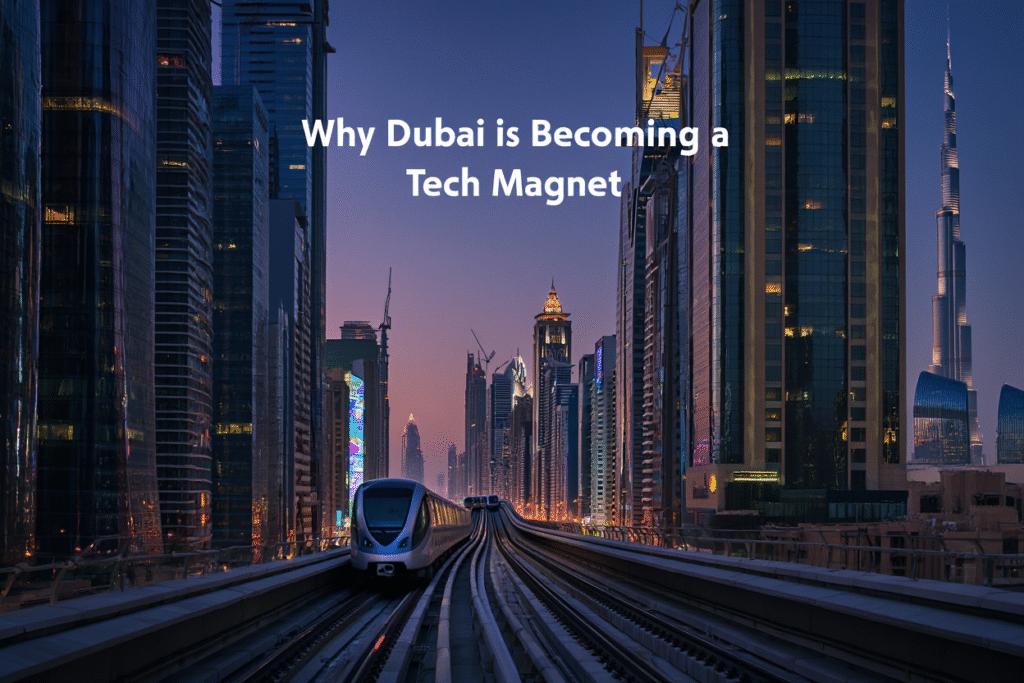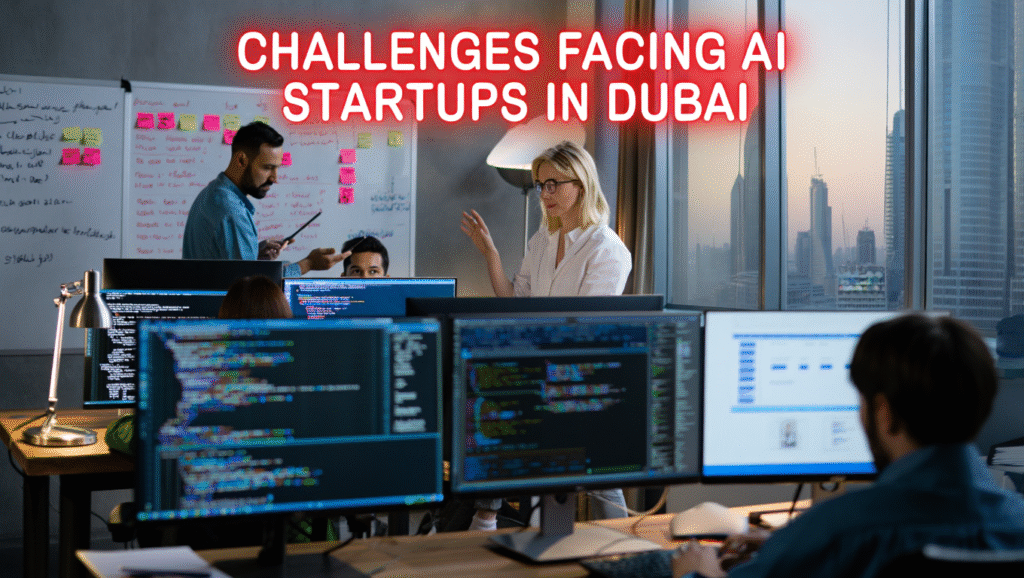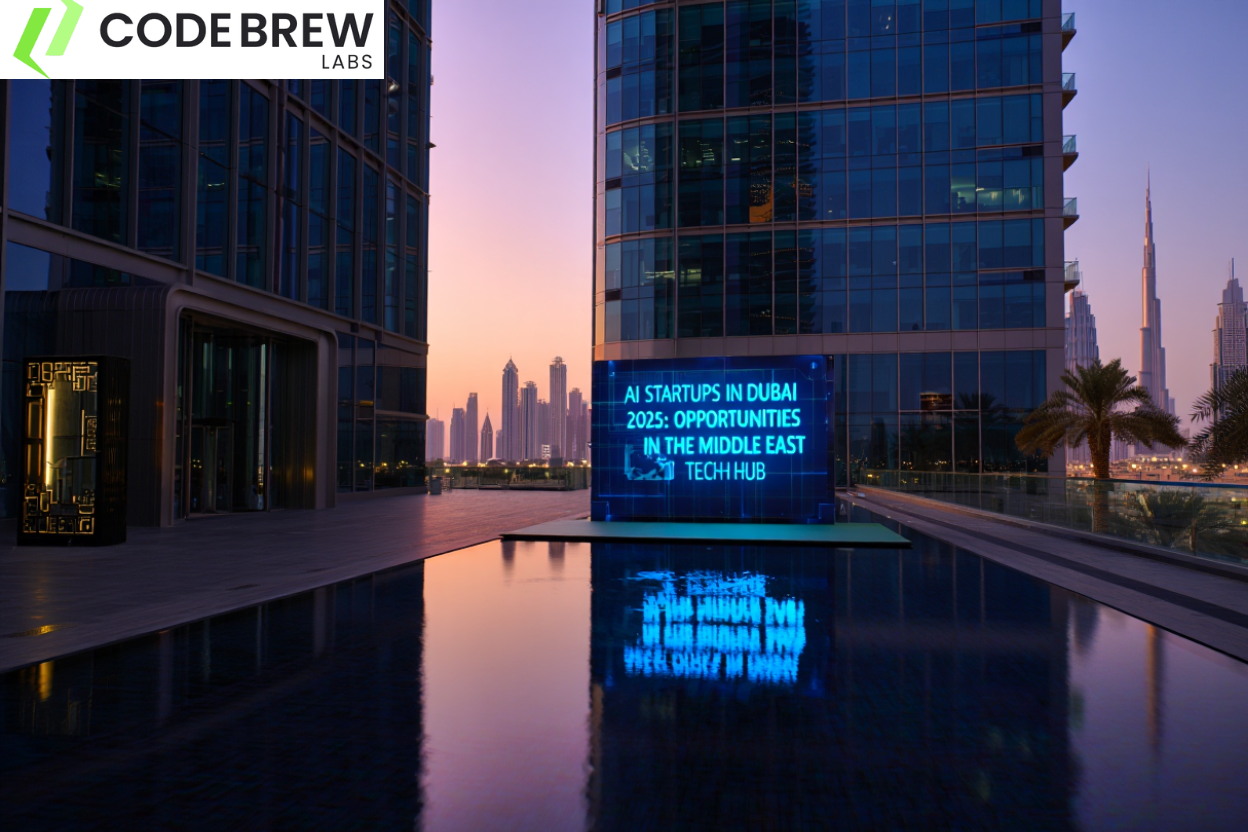IIntroduction to Dubai’s AI Ecosystem
Artificial Intelligence (AI) is no longer just a buzzword;it’s shaping industries, transforming economies, and rewriting the rules of innovation. When we look at global hubs for AI, places like Silicon Valley, London, and Singapore often come to mind. However, in 2025, Dubai is emerging as a rapidly growing leader in the Middle East, actively positioning itself as the AI capital of the region. The city’s ambitious goals, backed by a forward-thinking government, world-class infrastructure, and a strong focus on digital transformation, make it a fertile ground for AI startups and AI development companies in Dubai.
What makes Dubai unique is not just its adoption of AI technologies but its strategic integration into governance, business, and daily life. Unlike many regions where AI adoption is left largely to the private sector, Dubai has embraced a government-driven innovation model, ensuring that regulations, infrastructure, and funding align with the vision of building an AI-powered economy. This balance of policy support, venture capital inflow, and entrepreneurial spirit is creating fertile soil for startups and AI development companies in Dubai to thrive in areas like healthcare, finance, logistics, and smart cities.
Dubai’s AI ecosystem isn’t developing in isolation. It is part of a much larger strategy, the UAE Centennial 2071 Vision, that aims to make the nation a global leader in knowledge, innovation, and sustainability. The role of AI in this transformation cannot be understated, as it underpins advancements in automation, predictive analytics, robotics, and beyond. For startups and best AI development company in Dubai, this means that the city is more than just a regional market; it is a launchpad into the wider Middle East, North Africa (MENA), and global markets.
Dubai’s Vision for Artificial Intelligence

When discussing Dubai’s AI growth, it is impossible to ignore its long-term goal. By appointing a Minister of State for Artificial Intelligence in 2017, the United Arab Emirates demonstrated its commitment to the Fourth Industrial Revolution. By 2025, this vision will have become a reality, with AI-driven traffic systems, blockchain-based government services, smart healthcare solutions, and AI-powered financial platforms.
Dubai’s vision centers around efficiency, sustainability, and innovation. By embedding AI into government services, the city aims to reduce costs, enhance decision-making, and create a future-ready society. Startups, in particular, benefit from this strategy because the government not only opens up real-world testing grounds for AI solutions but also actively encourages pilot projects through sandboxes and regulatory frameworks. For instance, AI-based startups focusing on energy optimization or healthcare diagnostics often find early opportunities to partner with Dubai’s government institutions.
Moreover, Dubai’s AI vision extends beyond borders. The city is positioning itself as a regional hub for AI research and deployment, attracting global tech giants, investors, and researchers. This makes it easier for startups in Dubai to connect with international partners and scale beyond the UAE. The result is an ecosystem where innovation thrives, risks are mitigated, and entrepreneurs have the resources they need to grow.
Government Policies Driving AI Growth
Dubai has long been renowned for its economic models that are driven by policy. From free zones that attract international investment to cutting-edge projects like blockchain governance, the city is excellent at developing structures that foster creativity. AI is no different. The UAE AI Strategy 2031 was created to develop the country into a global AI powerhouse, with Dubai playing a key role in this effort.
Some of the most impactful policies supporting AI growth include:
- Regulatory Sandboxes: Startups can test AI-driven financial or healthcare solutions in controlled environments, avoiding immediate regulatory hurdles.
- Tax Incentives and Free Zones: Areas like Dubai Internet City and Dubai Silicon Oasis provide infrastructure, tax benefits, and access to accelerators specifically tailored for tech startups.
- AI-Friendly Legislation: Laws that govern data protection, AI ethics, and intellectual property ensure that startups operate in a secure and transparent environment.
- Startup Visa Programs: Dubai offers long-term visas and residency programs for entrepreneurs and AI specialists, making it easier to attract global talent.
The UAE’s government is not just regulating AI, it’s actively adopting AI solutions in governance. Whether it’s AI-powered immigration services, predictive traffic management, or AI chatbots for public queries, the government sets a real-world example that startups can replicate in private sector industries. This synergy between public policy and private innovation is one of Dubai’s biggest advantages in becoming an AI powerhouse by 2025.
Why Dubai is Becoming a Tech Magnet

Dubai’s rise as a tech magnet is not an accident. It’s the result of strategic investments, geographic advantages, and a pro-innovation culture. Let’s break down why so many AI startups are flocking to Dubai in 2025:
- Strategic Location: Dubai sits at the crossroads of Asia, Europe, and Africa, making it a natural gateway for startups to expand globally.
- World-Class Infrastructure: With smart city projects, cutting-edge data centers, and 5G connectivity, startups have the digital backbone they need.
- Access to Capital: Dubai attracts venture capitalists, angel investors, and government-backed funds eager to fuel AI innovation.
- Talent Pool: Through global recruitment programs and partnerships with universities, Dubai is nurturing the next generation of AI engineers, data scientists, and entrepreneurs.
- Lifestyle and Business Culture: Beyond tech, Dubai offers a high quality of life, safety, and a multicultural environment, making it attractive for international founders and employees.
This unique blend of infrastructure, capital, and vision has positioned Dubai as a preferred destination for AI startups. In fact, many entrepreneurs who initially considered cities like London or Singapore are now looking at Dubai as a cost-effective yet equally ambitious alternative.
Current Landscape of AI Startups in Dubai
As of 2025, Dubai is home to a rapidly growing ecosystem of AI startups, spanning diverse industries. Unlike many regions where startups tend to cluster around one or two dominant industries, Dubai encourages a multi-sectoral approach, allowing AI innovation to touch everything from logistics and energy to healthcare and real estate.
Some key highlights of the AI startup landscape include:
- Healthcare Startups: Companies developing AI-powered diagnostic tools, telemedicine platforms, and predictive healthcare analytics.
- FinTech AI: Startups offering AI-driven fraud detection, credit scoring, and automated financial advisory services.
- Smart City Solutions: AI startups working on traffic prediction, energy efficiency, waste management, and security surveillance systems.
- Retail & E-Commerce: Personalized shopping experiences, AI-driven supply chain optimization, and customer service automation.
One standout example is Derq, a Dubai-based AI startup that uses machine learning and computer vision to enhance road safety and smart mobility. Another is Fero.ai, which leverages AI to automate supply chain management. These companies are not just solving local problems but are also scaling globally, thanks to Dubai’s international connections.
Adding to this momentum are incubators, accelerators, and innovation hubs like Dubai Future Accelerators, in5, and Hub71 (in nearby Abu Dhabi, with close ties to Dubai). These programs provide mentorship, funding, and direct access to government projects, making Dubai one of the most supportive ecosystems for AI entrepreneurs.
Government Initiatives Empowering AI Startups
The backbone of Dubai’s AI revolution lies in government initiatives that directly empower startups. Unlike many regions where private investors or corporations drive the innovation agenda, Dubai’s government plays an active role in building the ecosystem. This top-down support ensures that AI startups are not just chasing market opportunities but also aligning with national priorities.
One of the most influential programs is the Dubai AI Strategy 2031, which sets clear goals for integrating AI into every sector of the economy. The strategy outlines targets for healthcare, transport, renewable energy, education, and even public safety. By mapping out this vision, startups can better understand where to focus their innovations and how to integrate their solutions into real-world applications.
In addition, the UAE has established free zones for innovation, including Dubai Internet City, Dubai Silicon Oasis, and DIFC Innovation Hub. These zones provide firms 100% foreign ownership, tax breaks, access to accelerators, and networking opportunities with global investors. This lowers access barriers considerably and makes Dubai a desirable starting point for AI startups.
The Dubai Future Foundation is another important actor, providing initiatives such as the Dubai Future Accelerators (DFA), which allow businesses to collaborate directly with government agencies to use AI to tackle real-world problems. As a result, entrepreneurs have a unique chance to land government contracts early on, increasing their credibility and sources of income.
Dubai AI Strategy 2031
The Dubai AI Strategy 2031 deserves special attention because it is the guiding framework for AI development in the emirate. The strategy focuses on three pillars:
- Government Efficiency – Making public services smarter, faster, and more cost-effective with AI.
- Industrial Growth – Encouraging private companies and startups to adopt AI in their operations.
- Global Leadership – Positioning Dubai as a hub for AI innovation and attracting global talent.
Under this plan, the government is investing heavily in AI research centers, training programs, and partnerships with universities. Startups benefit from these investments by gaining access to cutting-edge technologies, research grants, and skilled professionals. This ecosystem creates a win-win model where both startups and the government push AI adoption forward.
Investment and Funding Opportunities
A vibrant AI startup ecosystem cannot thrive without capital, and Dubai understands this well. The government, along with private investors, is fueling growth through venture capital funds, grants, and accelerator programs. Some notable funding sources include:
- Dubai Future District Fund (DFDF) – A $275 million fund that supports startups in AI, fintech, and the digital economy.
- Mohammed Bin Rashid Innovation Fund (MBRIF) – Provides funding and mentorship for entrepreneurs developing cutting-edge technologies.
- Angel Investor Networks – Groups like Dubai Angel Investors actively seek AI-focused startups with high growth potential.
Additionally, global venture capital firms are increasingly eyeing Dubai, given its role as a gateway to the Middle East and Africa. This makes Dubai an attractive place for startups that want to scale quickly. What’s more, government-backed funds often invest in early-stage startups, providing them with the runway needed to grow before private investors step in.
Public-Private Partnerships for AI Growth
Public-private partnerships (PPPs) are one of the unique features of Dubai’s AI ecosystem. Instead of relying solely on startups to innovate, Dubai often collaborates with private companies and entrepreneurs to co-create solutions. For example, AI-driven mobility solutions developed in partnership with the Roads and Transport Authority (RTA) are being used to improve traffic flow and road safety.
These partnerships open doors for startups to test their technologies on a city-wide scale, something that is difficult to achieve in many other parts of the world. Whether it’s AI in healthcare with the Dubai Health Authority or AI-driven logistics with DP World, startups get to work alongside government institutions and large corporations. This not only validates their solutions but also builds trust with potential investors and customers.
Opportunities for AI Startups in 2025

Dubai in 2025 presents immense opportunities for AI startups across multiple industries. With its smart city agenda, advanced infrastructure, and strong demand for automation, the city offers startups real chances to scale their technologies. Let’s explore the top sectors where AI startups can make the biggest impact.
AI in Healthcare
One of the most promising industries for AI adoption in Dubai is healthcare. The government is aggressively promoting the revolution of digital health, with artificial intelligence at its core. Startups in the healthcare industry can look into potential in:
- AI Diagnostics – Machine learning tools that can detect diseases early, reducing the burden on hospitals.
- Telemedicine Platforms – AI-powered chatbots and virtual doctors providing 24/7 healthcare access.
- Predictive Analytics – Using AI to forecast patient needs, optimize hospital resources, and improve treatment outcomes.
- Personalized Medicine – Leveraging AI to tailor treatments based on genetic data and lifestyle factors.
For instance, startups developing AI tools for cancer detection or chronic disease management have a direct path to integrate with the Dubai Health Authority’s initiatives. The rising demand for efficient, cost-effective, and accessible healthcare ensures that AI in this sector will remain a top priority for years to come.
AI in FinTech and Banking
Dubai is a global financial hub, and its FinTech sector is booming with AI adoption. Startups in this space are creating solutions for:
- Fraud Detection and Risk Management – AI systems that identify suspicious transactions in real time.
- Credit Scoring Models – Using AI to evaluate creditworthiness beyond traditional methods.
- Robo-Advisors – Automated investment platforms making financial advice accessible to everyone.
- RegTech Solutions – AI tools helping banks comply with regulations efficiently.
With Dubai International Financial Centre (DIFC) hosting hundreds of financial institutions and startups, the city provides an ideal ecosystem for AI-driven FinTech companies. As digital banking adoption grows in the Middle East, AI startups will continue to see massive opportunities in fraud prevention, payments, and wealth management.
AI in Smart Cities and Infrastructure
Dubai has been working on its Smart Dubai initiative for years, and AI plays a central role. From autonomous vehicles to smart energy grids, the city is integrating AI into every aspect of its infrastructure. Opportunities for startups include:
- Urban Mobility – AI solutions for traffic prediction, ride-sharing optimization, and autonomous transport.
- Energy Optimization – AI-driven systems that manage electricity consumption and renewable energy integration.
- Public Safety – AI-powered surveillance and crime prevention tools.
- Waste and Water Management – Predictive AI models improving sustainability efforts.
Dubai aims to be one of the world’s smartest cities by 2030, and startups that contribute AI solutions to this mission will not only find government support but also a ready market of private businesses and consumers.
AI in Retail and E-Commerce
The Middle East’s e-commerce market is growing rapidly, and Dubai sits at the heart of it. AI startups in this sector are exploring:
- Personalized Shopping – AI tools that recommend products based on consumer behavior.
- Customer Service Automation – Chatbots and voice assistants are improving user experience.
- Inventory Management – Predictive AI for supply chain efficiency.
- Visual Search and AR Shopping – Combining AI with augmented reality for immersive retail experiences.
With Dubai hosting major retail events like Expo City exhibitions and e-commerce summits, AI startups in retail have endless opportunities to showcase and scale their innovations.
Challenges Facing AI Startups in Dubai

While Dubai provides an incredibly supportive ecosystem for AI startups, the journey is not without hurdles. For every success story, some challenges must be addressed. Recognizing these obstacles helps entrepreneurs and investors prepare better and adapt their strategies for sustainable growth.
Funding Barriers and Competition
Although Dubai is attracting more venture capital than ever, securing consistent funding remains a challenge for early-stage AI startups. Investors in the Middle East are traditionally more conservative, often preferring businesses with proven revenue models over experimental or research-heavy ventures. This can make it difficult for AI startups—many of which require significant upfront investment in data collection, algorithm training, and infrastructure—to get off the ground.
Another key barrier is intense competition. As Dubai positions itself as a global AI hub, startups are not only competing with local players but also with international firms entering the market. While this competition raises the bar for innovation, it also means smaller startups must work harder to stand out, differentiate their solutions, and prove their value in crowded sectors like FinTech or healthcare.
One solution lies in building strategic partnerships with government entities, universities, or corporate accelerators. Such alliances provide not only funding but also validation and access to large-scale projects, which can significantly strengthen a startup’s reputation in the market.
Talent Acquisition and Skills Gap
AI is a talent-driven industry, and finding skilled professionals is one of the biggest challenges for startups in Dubai. While the government is investing heavily in education and training programs, the demand for AI engineers, machine learning experts, and data scientists far exceeds the current supply.
Many startups are forced to compete with global companies and software giants, which can provide greater benefits and more money for employees. This poses a significant talent retention problem for smaller firms with tighter budgets. Furthermore, even though Dubai draws workers from all over the world, early-stage businesses may find it difficult to obtain the necessary visas and relocate overseas expertise.
To overcome this, many startups are turning to remote talent pools, outsourcing certain technical tasks to developers in other countries while keeping their core operations in Dubai. Additionally, Dubai’s partnerships with universities are beginning to close the talent gap, producing graduates trained specifically in AI and data-driven disciplines.
Ethical and Regulatory Concerns
As AI adoption accelerates, so do the ethical questions surrounding its use. Issues like data privacy, algorithmic bias, and the potential misuse of AI technologies are under increasing scrutiny. For startups in Dubai, this means navigating a delicate regulatory environment that balances innovation with ethical responsibility.
The UAE government has introduced AI ethics guidelines and data protection laws to ensure responsible use. While these frameworks provide much-needed clarity, they can also pose additional compliance costs for startups. For instance, AI startups handling sensitive healthcare or financial data must invest heavily in cybersecurity and compliance systems to meet government requirements.
Yet, this challenge also represents an opportunity. Startups that can build trustworthy, transparent, and ethically responsible AI solutions will stand out in the market. By prioritizing responsible AI, startups not only comply with regulations but also gain consumer confidence, which is crucial in industries where trust is everything.
Conclusion
Dubai in 2025 is no longer just a futuristic city of skyscrapers and luxury; it is rapidly becoming the Middle East’s AI powerhouse. With strong government support, an ambitious AI strategy, and a growing pool of entrepreneurs, the city has positioned itself as a global hub for innovation. Startups in Dubai have the opportunity to shape industries ranging from healthcare and finance to smart cities and retail.
However, the road to success is not without its challenges. Funding constraints, the global competition for talent, and ethical considerations present real hurdles. Yet, these very challenges also foster resilience, creativity, and collaboration, qualities that are essential for the long-term success of any startup ecosystem.
For founders, investors, and innovators, Dubai in 2025 represents a landscape of opportunities, one where AI is not just a tool for business but a cornerstone of the city’s vision for the future. The Middle East is watching, and the world is taking notice: Dubai is on track to become not just a regional tech hub, but a global leader in AI innovation.
FAQs
1. Why is Dubai considered a hub for AI startups in 2025?
Dubai offers government-backed AI strategies, tax-free free zones, world-class infrastructure, and access to global markets, making it one of the most attractive destinations for AI entrepreneurs.
2. Which industries in Dubai present the biggest opportunities for AI startups?
The top industries include healthcare, FinTech, smart cities, infrastructure, and retail, all of which are actively integrating AI technologies.
3. What are the biggest challenges AI startups face in Dubai?
The main challenges are funding barriers, competition from global firms, talent shortages, and navigating ethical and regulatory requirements.
4. How does the Dubai government support AI startups?
Through initiatives like the Dubai AI Strategy 2031, the Dubai Future Accelerators program, dedicated free zones, and funding from innovation funds, the government actively empowers AI businesses.
5. Can AI startups in Dubai scale internationally?
Yes, Dubai’s strategic location, global connectivity, and partnerships with international investors and corporations make it a strong launchpad for regional and global expansion.


